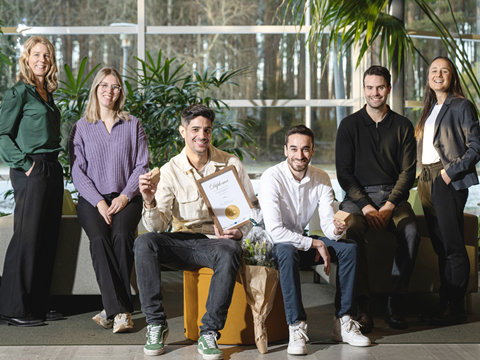
Karlstads Energi and ReKorek have teamed up to explore the possibilities of recycling wine corks into new products following the latter’s success in a European innovation challenge.
Karlstads Energi and Paper Province co-organized an international BioBoosters Hackathon innovation challenge, supported by various Swedish, Finnish, Estonian, Latvian, Lithuanian, Polish, and German organizations. This was an open call encouraging European businesses to help tackle the challenges associated with recycling wine corks.
“Currently, there’s no recycling system for wine corks in Sweden,” explains Malin Pettersson, recycling manager at Karlstads Energi. “They are incinerated and converted into district heating. While this process has its benefits, Karlstads Energi sees untapped potential in reusing cork because of it natural and sustainable material.”
Nordic Surface and Reselo were among the companies selected to work with mentors in business, product development, value propositions, and communication to refine their solutions. However, ReKorek was selected as the winner, since it already oversees a cork collection system in Poland and plans to expand into other markets.
“Rekorek presented a sharp and concrete solution that clearly demonstrates it is possible to create an efficient collection process for the reuse of natural corks,” Pettersson continues. “We see great potential in the concept and look forward to exploring the opportunities for future collaboration.”
“The approach has been designed to find innovative solutions to business challenges,” adds Magnus Persson, project manager at Paper Province. “By openly announcing challenges and actively seeking solutions from companies and researchers new collaborations can begin. We are excited to follow Rekorek and Karlstads Energi’s journey.”
A similar initiative was announced in the UK this year, with retailer Waitrose trialling a natural cork recycling scheme. Instead of condemning 25 million corks to landfill every year, it hopes to repurpose them into placemats, coasters, flooring, shoes, or mulch.
Recycling processes like these would benefit developments in cork-based packaging, such as the refillable deodorant cartridge designed by Laura Meehan from the start-up Let’s Rethink This. Supported throughout its development by Lancaster University, the solution is set to be both recyclable and renewable, with cork trees able to regenerate after each harvest of bark.
Cork trees also sequest carbon, with cosmetics retailer Lush championing cork as a flexible, strong, anti-bacterial, fire-retardant, and water-resistant packaging material. It has refined a prototype shampoo bar case produced by Cork Connections and manufactured the packs on a commercial scale in Portugal.
If you liked this story, you might also enjoy:
The ultimate guide to the Packaging and Packaging Waste Regulation in 2024
How are the top brands progressing on packaging sustainability?
Sustainable Innovation Report 2024: Current trends and future priorities
Everything you need to know about global plastic sustainability regulation














No comments yet